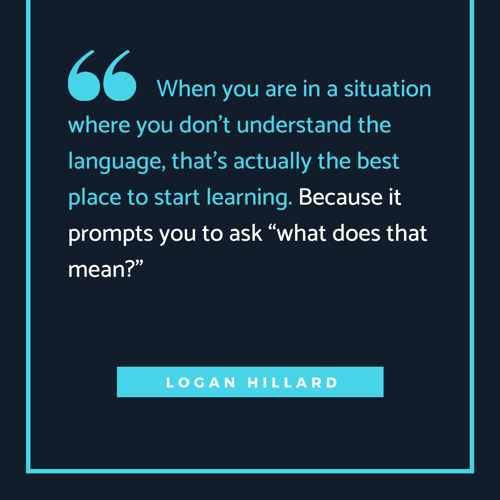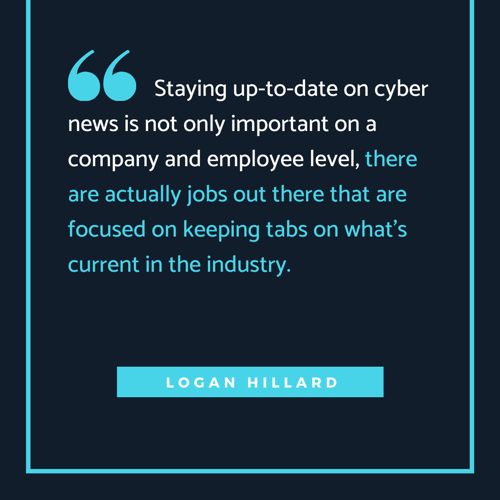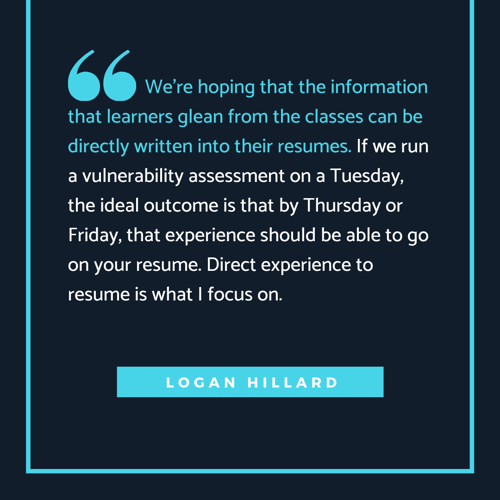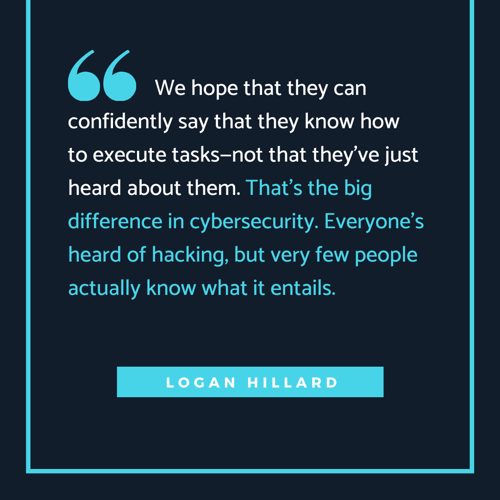Divergence Blog
Latest
- Red vs Blue: Decoding Cybersecurity Team Roles
- From Teacher to Tech Pro: Your Guide to a Rewarding Career Transition
- Navigating the VET TEC Pause: Choosing the Right Path for Tech Education.
- The Future of Work in the Age of Quantum Computing and AI
- What is Capture the Flag?
- KQL vs SQL
- How to Advance Your Career with Advanced Postgres
- Alumni Series: How Michael Williams Became a Cybersecurity Pentester
- A Veteran Success Story with Antonio Grant
- Leveraging a Cybersecurity Bootcamp to Launch a Career in Tech
Meet Our Instructor: Logan Hillard
“We're hoping that the information that learners glean from the classes can be directly written into their resumes. If we run a vulnerability assessment on a Tuesday, the ideal outcome is that by Thursday or Friday, that experience should be able to go on your resume. Direct experience to resume is what I focus on.”—Logan Hillard
Logan Hillard is a Network Engineer and Administrator with a specialization in Security. He currently teaches at Divergence Academy’s program.
Thank you so much for joining us on our Instructor Perspectives series, Logan. Let’s start off by diving into your background and how you got into cybersecurity?
In a nutshell, I went the college route and discovered that it wasn’t for me: I signed up for Environmental Sciences, did a bit of English, and even tried to be an air traffic controller at one point.
Then someone told me that I could make money with computers. As a gamer, I've been on computers my entire life so that remark hit home, and was the impetus for starting my IT career. From there, I went out and got certifications and started a job as a Tier 3 Network Engineer at Microsoft before getting promoted as a tech lead.
After that, I went to Divergence, and while I was in the program, I got a remote gig working at a pen testing company out of New York. Unfortunately, due to COVID, that job didn’t last long. Thankfully that same week, Sravan called, and now I’m here.
A quick seque since you mentioned gaming: what games did you play and are you still playing?
I played World of Warcraft for far too many years. Currently, I’m into space and flight simulations as well as racing sims. Right now, I’m playing F1 games and I’m really into Star Citizen.
Thank you for sharing that. Can you share a bit about what your Divergence student experience was like?
I was in the Cybersecurity Penetration Tester (CPPT) program. It was there that I got my first hands-on experience with Kali (Linux), Python, and other methodologies.
Being in IT is nothing like being in cybersecurity. They are two completely different paths. IT is at the very beginning of that, so until I came to Divergence, I had no knowledge of hacking or the other methods associated with cyber.

Moving into you as an instructor, mind briefly describing your teaching style?
One of the things that I emphasize in class is that memorization is not necessary. In this field, we have a lot of acronyms and it can be easy to get caught up in memorizing the words that make up the acronym without understanding what they really mean.
For example, if I ask someone what DHCP means, the answer is not Dynamic Host Configuration Protocol. Those are just words that describe what the function or application is.
In class, I prefer taking an approach that gets students to act on concepts. If we're discussing hacking, we just hack, because there's no better way to learn than to do.
There's very little science that says that memorizing helps you learn a language. Our Director of Academics, Case Copeland, speaks a lot about language acquisition and how what we are doing is essentially trying to teach the students a new language. In order to do that, we have to take more scientific approaches of putting students in an environment where they're surrounded by people speaking the language.
In class, that means I start speaking at a high-level immediately. The purpose of that is to help jump-start engagement with the learners. It pushes them to start asking questions.
When you are in a situation where you don't understand the language, that's actually the best place to start learning. Because it prompts you to ask “what does that mean?”
Can you walk us through an average day in class?
I open with a lot of engagement questions, including pop quizzes, which helps structure the content that we’re tackling on any given day. From there, I try to shoot the conversation in a different direction and have the students interact with each other as much as possible.
I tend to fly through the content slides, so that there’s ample time for the learners to get hands-on experience on the topics discussed.
Another thing I include in my classes is a focus on cybersecurity news. Staying up-to-date on cyber news is not only important on a company and employee level, there are actually jobs out there that are focused on keeping tabs on what’s current in the industry.
A former student of ours actually does that for a living. He follows the news and then collates all that information into a report that is presented to C-level executives.

Do you know what that job title is?
The company that hired him actually created the job title for that post because it was new. I believe it was something to the effect of a Threat Analysis Engineer.
Interesting! So, when COVID hit and we transitioned from live in-person classes to a fully-remote live delivery, did your teaching style have to evolve? If so, how?
The Divergence methodology focuses on full-time professionals transitioning into a new career path. Since that was my personal experience, the approach I take with my classes is something similar.
Prior to coming to Divergence, the remote learning scenario was what I was familiar with. I had already taught four classes remotely by then and had worked in IT helping people troubleshoot. And as mentioned, I am also a gamer, so talking to people online is almost second nature.
But while the transition from live in-person to fully-remote didn’t directly impact the way I taught, my teaching style did evolve over the course of the program. That was me moving away from content-focused teaching into a more experiential model for the students.
How do you think the experiential learning model impacts learner outcomes?
We're hoping that the information that learners glean from the classes can be directly written into their resumes. If we run a vulnerability assessment on a Tuesday, the ideal outcome is that by Thursday or Friday, that experience should be able to go on your resume. Direct experience to resume is what I focus on.
I want to be able to tell learners that at the end of this week, you will be able to say that you can do X. That should go on your resume, as long as you can explain it.
Overall, we hope that they can confidently say that they know how to execute tasks—not that they've just heard about them. That’s the big difference in cybersecurity. Everyone's heard of hacking, but very few people actually know what it entails.

You mentioned the difference between IT and cybersecurity—can you expound on that?
When students go through our program and get into the workforce, they often realize that some of the things they learn, most IT people don’t know about. I’m talking specifically Security+ and PenTest+.
IT is your base foundation and people in cybersecurity are always good at IT. But it’s not necessarily true the other way around.
Thank you for clarifying! Now let’s dive into the heart of this interview: what do you enjoy most about your work and what inspires you?
The enjoyment factor is definitely the helping part. Other than the fact that I was working with computers, that’s why I got into IT in the first place. Helping people is nice and the result of them being happy with your work is always great.
I never would have thought that I’d be a teacher. But it’s incredibly rewarding. Being able to help students understand their pathway is rewarding. Helping them understand that even though they don’t really know anything when they start out, they can get to where they want to be, as long as they just keep at it.
I’ve had some students who struggled with getting through the course content and who later on passed their exams. Hearing about things like that is a good feeling. That’s probably the best thing that I get from this job and why I’ll continue to keep doing it for as long as I can.
Do you have any anecdotes to share?
Recently, we had a student come through and he had complex PTSD. We were working with him to make sure that they were able to get through all the content and also master it at the same time. I make that distinction because getting through the content and mastering the content are two completely different challenges.
With this student specifically, we were worried about whether he was going to have the ability to pass the exams. But what’s great is that CompTIA worked with him to get more time, because it was hard for them to pass exams within the time slot.
I think we put in around 20 hours over the course of two or three months. He’s now moving towards passing his Cloud+ after passing Security+ and Net+. I have really high aspirations for him, and I think he's going to do very well.
That's probably one of my biggest achievements at the moment.

What would you say are your biggest challenges when teaching in a remote live set-up?
There are obviously a lot of challenges with remote teaching and the biggest ones are often things outside of our control. The Texas ice storm was a difficult week for us, because even with a remote setting, if I don't have power, there's not a lot that I can do.
Getting the students to stay on track and come back to class was a struggle, but Case and the virtual staff were amazing with providing support for instructors such as myself.
The other big challenge is really just focus. It's difficult to keep people on task. What’s great about the students who come to Divergence is that they want to be here; they have the drive. I’m blessed to have a group of students that are in that mindset. But even with that, keeping them engaged is definitely the hardest part.
We do our best to improve on our tactics, but it's not simple. I’ve found that gamers are actually some of the hardest to keep on track, because they're multitasking all the time. Some people have two or three monitors, and some of them game while I'm teaching.
Obviously, I can't really do anything about that. Overall, it's difficult to keep people's attention. That's really our biggest struggle.
Do you have any tactics up your sleeves for engagement, whether that's in the classroom or outside the classroom?
My engagement questions actually have very little to do with the point of the questions. It's more about me starting a conversation and then keeping people engaged in that conversation. That applies to bringing multiple students into the conversation and then having group conversations as well.
That methodology also helps foster relationships between the students, which is useful for your career because the relationships you build in these programs can land you your first job. That's what happened to me.
Looking towards the future, what kind of technology would you like to see implemented in order to better classes?
This is an interesting concept because I know that our founder, Sravan, has been considering doing some VR/AR scenarios. There are people that are on the fence about the concept, but it's already proven useful in a lot of different ways.
I once saw a college professor using a VR game. It was not built for that scenario, but he had a three-dimensional board that he would draw on, and that people could watch in a virtual environment.
We're already using a lot of platforms, so I think that it's going to take some other form of engagement (like VR or augmented) to drive change. Admittedly, I don't know what that's going to look like, and I don’t know if people are going to be interested in that, but I can see that as the next step for driving engagement for remote learners.
What is your best advice for someone who is interested in pursuing cybersecurity?
First of all: sign up for Divergence, obviously. But in all seriousness, my biggest takeaway is to just get started. If there is anything I would tell my younger self, it’s that I should get started earlier - and I started quite young. I'm only seven years into my career, and I'm turning 30 in August. I think if I would have started when I was 20, or even younger than that, I'd be further along.
I also don't think that there's really any one path that's better than another. But I think if people really want to make a change in their lives, they just have to start.
Finally, cybersecurity is not for everybody. But if you really want to get into it, remember that it's a process. If you can spend enough time to understand the process, you can do cybersecurity just about as good as everyone else. Continue your training, keep up with the latest news. Otherwise, you'll fall behind.
We are the leading vocational trade school for emerging technologies with industry experts as our instructors.
Gain relevant skills and meet the demands of our evolving tech landscape by signing up for our courses today.
View our course catalog or reach out to us and speak to a member of our team today!
